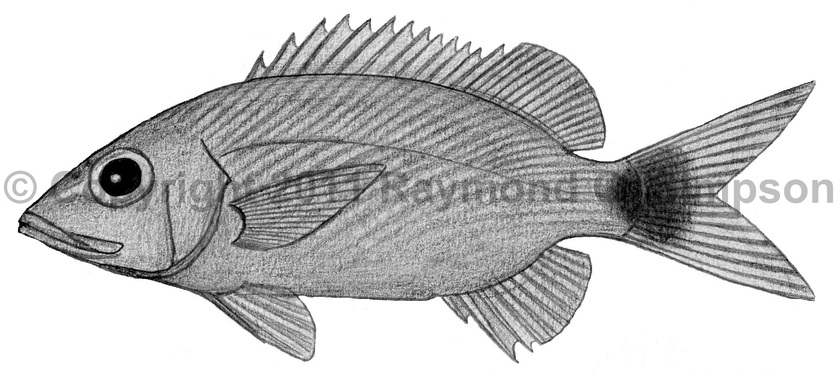
Common Name
Latin Grunt
Year Described
Carvalho, Marceniuk, Oliveira & Wosiacki, 2020
Identification
Dorsal Fin: XII, 15-17 (usually 16)
Anal Fin: III, 8-9 (usually 9)
Gill Rakers: 22-25 (total on first arch)
Lateral Line Scales: 51-52
Soft dorsal and anal fins almost completely scaled. Scale rows under lateral line oblique to body axis. 25-26 scales around caudal peduncle.
Color
Body and head silvery with narrow oblique dusky stripes above the lateral line and slightly oblique to horizontal stripes below it. Dusky stripes are similar in width to interspaces. Some yellow markings on head and on eye. A large dark blotch on the caudal peduncle and base of tail. All fins pale to dusky.
Size
Common to 20cm TL. Maximum size to 30cm TL.
Habitat
Coastal over soft and hard bottoms, from the shore to 30m. Rarely over coral reefs. Often forms small schools.
Range
Guatemala to Brazil.
References
Carvalho, C.O., Marceniuk, A.P., Oliveira, C., & W.B. Wosiacki. 2020. Integrative taxonomy of the species complex Haemulon steindachneri (Eupercaria; Haemulidae) with a description of a new species from the western Atlantic. Zoology, 141, 125782.
Lindeman, K.C. 2002. Haemulidae (pp. 1522-1550). In: Carpenter. 2002. The living marine resources of the Western Central Atlantic. Vol. 3: Bony fishes part 2 (Opistognathidae to Molidae). FAO Species Identification Guides for Fisheries Purposes. American Society of Ichthyologists and Herpetologists Special Publication No. 5. FAO of the U.N., Rome.
Other Notes
This is the Atlantic population of the species once called Haemulon steindachneri, which is restricted to the eastern Pacific.